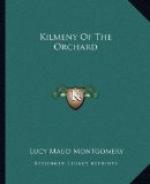On Tuesday afternoon there was a funeral in the district and, according to custom, the school was closed. Eric went again to the old orchard. He had no expectation of seeing Kilmeny there, for he thought she would avoid the spot lest she might meet him. But he could not keep away from it, although the thought of it was an added torment, and he vibrated between a wild wish that he might never see it again, and a sick wonder how he could possibly go away and leave it—that strange old orchard where he had met and wooed his sweetheart, watching her develop and blossom under his eyes, like some rare flower, until in the space of three short months she had passed from exquisite childhood into still more exquisite womanhood.
As he crossed the pasture field before the spruce wood he came upon Neil Gordon, building a longer fence. Neil did not look up as Eric passed, but sullenly went on driving poles. Before this Eric had pitied Neil; now he was conscious of feeling sympathy with him. Had Neil suffered as he was suffering? Eric had entered into a new fellowship whereof the passport was pain.
The orchard was very silent and dreamy in the thick, deep tinted sunshine of the September afternoon, a sunshine which seemed to possess the power of extracting the very essence of all the odours which summer has stored up in wood and field. There were few flowers now; most of the lilies, which had queened it so bravely along the central path a few days before, were withered. The grass had become ragged and sere and unkempt. But in the corners the torches of the goldenrod were kindling and a few misty purple asters nodded here and there. The orchard kept its own strange attractiveness, as some women with youth long passed still preserve an atmosphere of remembered beauty and innate, indestructible charm.
Eric walked drearily and carelessly about it, and finally sat down on a half fallen fence panel in the shadow of the overhanging spruce boughs. There he gave himself up to a reverie, poignant and bitter sweet, in which he lived over again everything that had passed in the orchard since his first meeting there with Kilmeny.
So deep was his abstraction that he was conscious of nothing around him. He did not hear stealthy footsteps behind him in the dim spruce wood. He did not even see Kilmeny as she came slowly around the curve of the wild cherry lane.
Kilmeny had sought the old orchard for the healing of her heartbreak, if healing were possible for her. She had no fear of encountering Eric there at that time of day, for she did not know that it was the district custom to close the school for a funeral. She would never have gone to it in the evening, but she longed for it continually; it, and her memories, were all that was left her now.
Years seemed to have passed over the girl in those few days. She had drunk of pain and broken bread with sorrow. Her face was pale and strained, with bluish, transparent shadows under her large wistful eyes, out of which the dream and laughter of girlhood had gone, but into which had come the potent charm of grief and patience. Thomas Gordon had shaken his head bodingly when he had looked at her that morning at the breakfast table.




